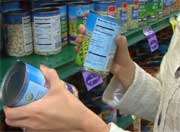Most supermarket coupons promote junk food, sugary drinks, study finds

(HealthDay)—Clipping coupons to trim your food budget might be bad for your waistline and your health, a new study suggests.
The study found that coupons offered by grocery stores often chop the costs of calorie-laden foods such as crackers, chips, desserts and sugary drinks. Relatively few markets discount lean meats, low-fat dairy products or fresh fruits and vegetables, the researchers said.
"We know from other studies that when you lower the price of foods, people buy more of them," said study author Dr. Hilary Seligman, assistant professor in residence at the University of California, San Francisco, School of Medicine. "When junk foods are the foods stores are lowering the prices of, we shouldn't be surprised that more of them are purchased."
The study, published this month in the journal Preventing Chronic Disease, looked at more than 1,000 online coupons offered by six major chain grocery stores in April 2013.
Processed snack foods, such as chips, crackers and desserts, made up the largest slice of the coupon pie (25 percent). Meanwhile, 14 percent of coupons were for frozen dinners and other prepared meals; 12 percent were for beverages (half of which were for sugary juices and drinks); 11 percent were for cereals; 10 percent were for condiments, such as salad dressing and mayonnaise; and 8 percent plied customers with discounts on processed meats, such as hot dogs and bacon.
In contrast, only 3 percent of coupons lowered the costs of fresh, frozen or canned fruits and vegetables, while 4 percent decreased the price of milk, eggs or yogurt. Only 1 percent trimmed the price of unprocessed meats.
Marion Nestle, a professor of nutrition, food studies and public health at New York University, said she was surprised there were any coupons for healthy foods.
Nestle said consumers need to remember that stores use coupons to lure customers. She said they're mostly offered for processed foods because those are the most profitable items stores sell, and they make deals with the manufacturers to promote their products.
"Coupons are about marketing, not health," said Nestle, who wasn't involved in the new research.
That's a shame, Seligman said, because low-income consumers often rely on coupons to stretch tight food budgets, including aid from the Supplemental Assistance Nutrition Program (SNAP).
A typical SNAP allocation budgets about $4.50 to feed one person for a day.
"The federal government intends for this to be supplemental, but most people don't have additional money to add to their SNAP budgets," Seligman said.
"The bottom line is that people are spending $4.50 on what they are eating," she said. "The only way to do that well or without feeling hungry often is to take advantage of the specials that grocery stores are offering. When all the specials are for candy, sweets and processed foods, it doesn't give the low-income consumer many choices."
More information: For more on access to healthy, affordable food, visit The Food Trust.
Copyright © 2014 HealthDay. All rights reserved.

















